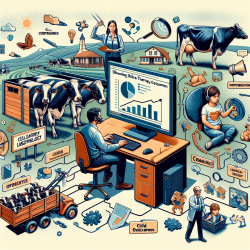Introduction
In the field of speech-language pathology, much like in agriculture, data-driven decisions are crucial for improving outcomes. The recent study on "Livestock hauler and dairy farmer perspectives about cull dairy cattle transport and cattle transport regulations in British Columbia, Canada" offers insights that can be translated into practice for enhancing online therapy services, particularly for children. This blog explores how practitioners can leverage research findings to refine their skills and improve therapy outcomes.
Understanding the Research
The study investigated the perspectives of dairy farmers and cattle haulers regarding the revised Canadian federal animal transport regulations. It highlighted the importance of communication and knowledge dissemination among stakeholders to ensure compliance and enhance animal welfare. Key barriers identified included limited awareness of regulations and inadequate communication along the transport chain.
Implementing Research Outcomes in Online Therapy
Just as the study emphasizes the importance of communication and knowledge in improving animal welfare, these principles are equally vital in online therapy services. Here are some strategies practitioners can adopt:
- Enhance Communication: Foster open communication channels with parents, teachers, and other stakeholders involved in a child's therapy. Regular updates and feedback loops can ensure everyone is aligned with the therapy goals and progress.
- Increase Knowledge Sharing: Provide educational resources to parents and caregivers to help them understand the therapy process and their role in supporting their child's progress. This aligns with the study's suggestion of offering educational resources about regulations to stakeholders.
- Utilize Data for Decision-Making: Use data collected during therapy sessions to make informed decisions about treatment plans. This mirrors the study's data-driven approach to understanding the impact of regulations on dairy cattle transport.
Encouraging Further Research
Practitioners are encouraged to delve deeper into research to continuously improve their practice. By staying informed about the latest studies and findings, therapists can adapt their approaches to better meet the needs of their clients. This commitment to ongoing learning is crucial for achieving optimal outcomes in therapy.
Conclusion
The parallels between the study on cull dairy cattle transport and online therapy services highlight the universal importance of communication, knowledge, and data-driven decision-making. By implementing these principles, practitioners can enhance their skills and create better outcomes for children in therapy.
To read the original research paper, please follow this link: Livestock hauler and dairy farmer perspectives about cull dairy cattle transport and cattle transport regulations in British Columbia, Canada.










